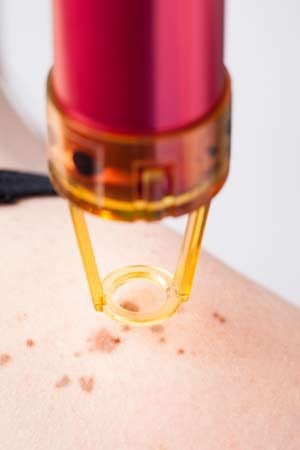Basal Cell Carcinoma Treatment Options

Basal cell carcinoma treatment most often focuses on the surgical removal of a cancerous growth. There are various surgical procedures that can be effective, depending on many factors — such as the size of the cancer and where it is located. If a cancer cannot be surgically removed or an initial surgery is unsuccessful, different nonsurgical treatments may be recommended. Sometimes, even when surgery is performed, other therapies may be used in conjunction.
Excisional surgery
During an excision, a surgeon removes the cancer along with a margin of healthy skin using a surgical knife. The surgeon then stitches the surrounding healthy skin together.
Mohs surgery
Also known as Mohs microscopic surgery or MMS, Mohs surgery is a slow, intricate process that requires a specialized surgeon. During this basal cell carcinoma treatment, the surgeon removes the cancer one very thin layer at a time, analyzing each layer as he goes. Once the surgeon reaches a layer that is free of cancerous cells, the process is complete. This complex procedure can leave more healthy skin surrounding the lesion, allowing for a better result aesthetically. In addition, Mohs surgery may yield better outcomes and a lower chance for recurrence than other procedures. Mohs surgery is offered in conjunction with the USF Department of Dermatology.
Curettage and electrodesiccation
This treatment involves removing the basal cell carcinoma with an instrument called a curette (a scraping tool) and then eliminating any remaining cancer cells using an electrode, or electric needle. This treatment may need to be performed more than once during the same visit.
Radiation therapy
Radiation therapy may be used in addition to surgery to ensure all traces of the cancer have been removed. This therapy is also sometimes used as a primary treatment for basal cell carcinoma if surgery is not an option. Radiation therapy uses high-energy rays to destroy the cancer cells. When treating basal cell carcinoma, radiation is delivered with an external device, using beams that don’t go deeper than the skin.
Topical Therapy
Certain medications can be applied directly to the skin to treat basal cell carcinomas. Usually this is only done for basal cell carcinomas that are relatively small and superficial. One cream (called imiquimod or Aldara) is used to boost the body’s immune system response against basal cell carcinoma. Another cream (called topical 5-FU or Efudex) is a chemotherapy agent that kills cancer cells.
Targeted Therapy
One of the unusual features of basal cell carcinoma is that it is almost always caused by overactive signals coming from a molecular pathway called the "Hedgehog" pathway, telling cells to divide. Two oral drugs that stop these signals are approved (called vismodegib or Erivedge and sonidegib or Odomzo) to treat very large, advanced or metastatic basal cell carcinomas.
Treatment for basal cell carcinoma at Moffitt Cancer Center
At Moffitt, we offer a complete range of basal cell carcinoma treatment. To provide each patient with an individualized treatment plan, our oncologists collaborate as a multispecialty team. Complex cases or those that have spread beyond the skin are discussed at a multidisciplinary tumor board to make evidence-based recommendations for the best possible options.
To make an appointment at Moffitt call 1-888-663-3488 or complete a new patient registration form online.
Helpful Links:
Treatment
